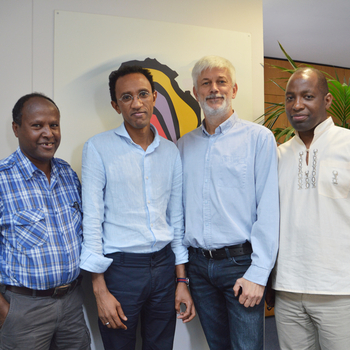Radio Erena: 03 October, 2014

The human rights situation in Eritrea was the subject of attention of key decision-makers who met to discuss the challenges faced in that country. The situation in Eritrea resulted in thousands of Eritreans fleeing the country, sometimes under dangerous conditions.
The Centre for Human Rights in collaboration with the Eritrean Movement for Democracy and Human Rights (EMDHR) hosted a seminar on human rights in Eritrea on Wednesday 29 October 2014. Participants in the event included key decisions makers in South Africa and members of the diplomatic corps who were drawn from Africa, Europe and the Middle East. Also present were members of the Eritrean community in the diaspora. The seminar commenced with welcome remarks from Prof Frans Viljoen, the Director of the Centre for Human Rights.
The aim of the seminar was to create awareness about the prevailing human rights situation in Eritrea and to discuss the international response.
Mr Mussie Ephrem, a Swedish-Eritrean who is an analyst specialising in the Horn of Africa, began by providing a comprehensive background into the history of Eritrea. He explained how the country had through the years evolved from efforts to liberate its people from oppression only to descend into one of the most repressive states as far as human rights are concerned.
Dr Martin Nsibirwa, a programme manager at the Centre for Human Rights, discussed some of the key human rights issues in Eritrea including extrajudicial killings, incommunicado detentions, the use of torture, indefinite military service, and the absence of freedoms of religion, movement and expression which are all acting as push factors for people to flee Eritrea. The result is that thousands of Eritrean people are embarking on dangerous journeys that sometime result in their ill-treatment, drowning on the Mediterranean Sea while crossing to Europe or being held for ransom by human traffickers from countries in the region.
The work done at the international level was discussed including decisions of the African Commission on Human and Peoples’ Rights, the work of the United Nations Special Rapporteur on human rights in Eritrea and the recent establishment by the United Nations of a Commission of inquiry that will investigate human rights in Eritrea.
The presentations raised much interest and discussions from participants.
Mr Kulubrehan Abraham Teweldemedhin, the Chairperson of EMDHR, in closing the seminar called on participants and their countries to support efforts aimed at finding solutions to Eritrea’s challenges. He appealed to participants that attention should be paid to addressing the root cause of the Eritrean problems rather than focusing solely on dealing with symptoms such as the refugee issues.
Source:- Pritoria University(http://www.chr.up.ac.za)
===============================================================
